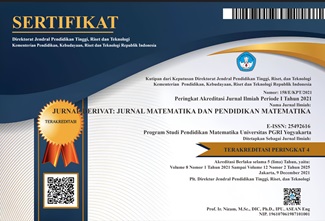Kepraktisan E-Module Berbasis Project Based Learning Pada Materi Vektor
DOI:
https://doi.org/10.31316/j.derivat.v9i1.3188Abstract
The purpose of this study is to evaluate the feasibility of vector e-modules based on project-based learning for students in class X SMA. This study is a continuation of development research using a 4D model (define, design, development, and dissemination). The feasibility of the e-module is assessed in the development section, which includes three trial stages: one-to-one, small group, and field test. 35 students from SMA Negeri 15 Palembang participated in this study. Questionnaires, interviews, and written tests were used to collect data. The results of the questionnaire and written test were analyzed quantitatively, while the data from interviews were analyzed qualitatively. Based on the results of the one-to-one stage, it is clear that the e-module has an interesting appearance, is simple to use, and includes videos to help students understand the material. The e-module has a practicality level of 77,4 % in the small-group stage and 79,4 percent in the field test stage. This data is backed up by students' ability to solve vector material problems in the e-module, which is 78.4 percent at the field test stage. Based on the data analysis results, it is possible to conclude that the e-module vector based on project-based learning is practically used in learning with a moderate level of practicality.
Â
Keywords: E-Module, Project Based Learning, Vector
References
Abdullah, Ramadhan, S., & Linda, R. (2020). Pengembangan E-Moduleinteraktif Chemistry Magazine Berbasis Kvisoft Flipbook Maker Pada Materi Laju Reaksi. Jurnal Zarah .
Adha, S. M. (2021, April). Akupintar.Id. Retrieved Februari 12, 2022, From Akupintar.Id Web Site: Https://Akupintar.Id/Info-Pintar/-/Blogs/Vektor-Matematika-Pengertian-Rumus-Dan-Contoh-Soal
Ariskasari, D., & Pratiwi, D. D. (2019). Pengembangan Modul Matematika Berbasis Problem Solving Pada Materi Vektor. Jurnal Matematika .
Himmi, N., & Husna, A. (2018). The Effectiveness On The Use Of Constructivism-Based Vector Analysis Module For 4th Semester Students In Department Of Mathematics Education Unrika In Academic Year Of 2016/2017. Mathematics Research And Education Journal .
Kurniasari, I., Rakhmawati, R., & Fakhri, J. (2018). Pengembangan E-Module Bercirikan Etnomatematika Pada Materi Bangun Ruang Sisi Datar. Indonesian Journal Of Science And Mathematics Education .
Ramadanti, F., Mutaqin, A., & Hendrayana, A. (2021). Pengembangan E-Modul Matematika Berbasis Pbl (Problem Based Learning) Pada Materi Penyajian Data Untuk Siswa Smp. Jurnal Pendidikan Matematika .
Sa'adah, N., & Wahyu. (2020). Metode Penelitian R&D (Research And Development). Malang: Literasi Nusantara.
Sudrajat, A., & Hernawati, E. (2020). Model - Model Pembelajaran.
Sugiyono. (2019). Metode Penelitian Pendidikan. Bandung: Alfabeta.
Wahyudi, D. (2019). Pengembangan E-Modul Dalam Pembelajaran Matematika Sma Berbasis Android. Jurnal Pendidikan Matematika .
Zahriah, Hasan, M., & Jalil, Z. (2016). Penerapan Pemecahan Masalah Model Polya Untuk Meningkatkan Kemampuan Analisis Dan Hasil Belajar Pada Materi Vektor Di Sman 1 Darul Imarah. Jurnal Pendidikan Sains Indonesia , 166.
Downloads
Published
Issue
Section
Citation Check
License
Authors who publish with this journal agree to the following terms:
-
Authors retain copyright and grant the journal right of first publication with the work simultaneously licensed under a Creative Commons Attribution-ShareAlike 4.0 International License that allows others to share the work with an acknowledgment of the work's authorship and initial publication in this journal.
- Authors are able to enter into separate, additional contractual arrangements for the non-exclusive distribution of the journal's published version of the work (e.g., post it to an institutional repository or publish it in a book), with an acknowledgment of its initial publication in this journal.
- Authors are permitted and encouraged to post their work online (e.g., in institutional repositories or on their website) prior to and during the submission process, as it can lead to productive exchanges, as well as earlier and greater citation of published work (See The Effect of Open Access).







